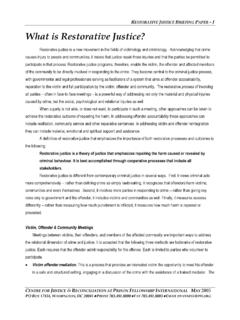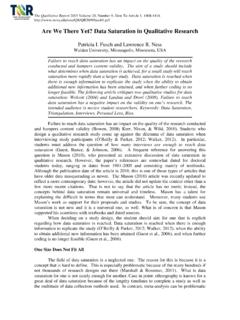Transcription of Conceptualizing Social Justice in Social Work: Are Social ...
1 Journal of Social Justice , Vol. 4, 2014 ( 2014) ISSN: 2164-7100 Conceptualizing Social Justice in Social Work: Are Social Workers Too Bogged Down in the Trees? Karen Morgaine1 Social work organizations such as NASW, CSWE, IFSW highlight Social Justice as a primary value and function of Social work, yet scholars suggest there are multiple meanings attached to the term, which leads to a lack of clarity. Little research has examined how Social workers define Social Justice and how/if they engage in Social Justice in their work. Focus groups were held with Social workers to ascertain how participants define and apply Social Justice to the work that they do.
2 Results point to a focus on Social Justice as individual rights-based, which can be complicated by multiple meanings. Additionally, participants focused on the potential for the term to cause discomfort and for this to inhibit actualizing Social Justice in practice. [Article copies available for a fee from The Transformative Studies Institute. E-mail address: Website: 2014 by The Transformative Studies Institute. All rights reserved.] KEYWORDS: Social Work and Social Justice , Social Work Education, Social Justice , Social Justice Practice. 1 Karen Morgaine, is an Assistant Professor in the Sociology Department at California State University Northridge.
3 She teaches practice and policy courses with a focus on Social Justice , macro practice, community organizing, and LGBTQQIP communities. Her research focuses on using qualitative research methodologies to examine power and privilege in Social movements. Areas of interest include LGBTQQIP movements; framing of Social problems; radical/progressive Social movements; domestic violence; human rights; globalization and Social movements; and poverty. Dr. Morgaine practiced in Social work for over ten years in the mental health and domestic violence, primarily with families involved with child protective services. Please address correspondences to: Karen Morgaine, California State University Northridge, Dept.
4 Of Sociology, 18111 Nordhoff Street, Northridge, California 91330-8318; e-mail: 2014 Transformative Studies Institute Karen Morgaine 2 And I think once we lose touch with Social Justice , we kind of lose touch with what we re actually supposed to be doing. WHAT S IN A NAME? When I proposed a name change from Social welfare to Social welfare and Social Justice for the concentration that I coordinate, I naively presumed it would be viewed as a positive and timely change. The impetus for this proposal stemmed from my desire to have the name reflect a broader macro perspective. I believe the term Social welfare tends to evoke concepts of direct service provision, primarily to individuals and families temporary measures to provide aid and support.
5 While I have over 10 years experience in direct micro and mezzo practice, my teaching focuses on macro/structural issues and I was hoping the name change would be more inclusive and perhaps more dynamic. My department is a sociology department populated almost exclusively with sociologists. My name change proposal received a mixed response from support, to disinterest, to questions about whether it would have a negative impact on students. The questioners asked for data about the impact what would Social workers and agencies in the area think about the change?
6 So I set out to see for myself. Having recently relocated to the area and no longer working in direct services, I had limited contacts, yet I informally asked a few of my contacts through field placement classes. The individuals I spoke with felt that Social work and Social welfare provision should be based on Social Justice and were supportive of the potential name change. For example, one community partner stated, Given that advocacy, insuring that our clients are treated fairly under the law and educating the community are large parts of what we do, I think the change would more accurately reflect what working in this field involves.
7 A part-time faculty member who worked in the mental health field offered to do an informal poll in his office. I was most intrigued by the oppositional responses of which there were 3 out of 12. They felt that the term Social Justice was too political, which suggested that they would shy away from the use of the term. As someone who sees Social issues as political issues and who believes that Social work has strayed far from some of its early activist roots (see Olson, 2007; Specht & Courtney, 1994), this seemed to be the challenge I needed to inquire a bit more deeply into (the ways that Social workers and others working in the Social services fields defined their work in the context of Social Justice ).
8 Journal of Social Justice 3 Social Justice AND Social WORK Social Justice , while a complex and contested term, is identified by many as an organizing value and foundation of Social work (Marsh, 2005; Reisch, 2002, 2007; Van Soest, 2007; Wakefield, 1988). While there has been an upsurge in dialogue about the meaning and role of Social Justice in Social work, it has been a part of Social work since the early beginnings during the Progressive Era, cited by foremothers such as Addams and Abbott (Reisch, 2002). Reisch provides an historical overview noting that the early intersections of Social work and Social Justice values and practices were evident in the community and political work of settlement house workers and the principles of the Rank and File Movement.
9 From the New Deal through the War on Poverty, Social workers pursuing Social Justice have supported the institution of a welfare state in the US as a way to ameliorate systemic inequalities based in class disparities. As severe cutbacks to welfare programs began in the 1980s through the present time, Social workers seeking Social Justice remedies have often refocused their attention to peace and anti-war movements and a variety of identity-based movements such as women s rights, civil rights, LGBTQQI rights, among others. This shift, based in the changing terrain of Social movements and influenced by increased attention to identity-based claims rather than class-based claims, has led to a groundswell of changes in the Social and political landscape and to a complex dialogue related to diversity, multiculturalism, and Social Justice .
10 These changes have led to a concerted effort to understand the applications and definition of Social Justice within the Social work field. Numerous authors have presented critical theoretical discussions regarding the tensions of multiculturalism and Social Justice (Caputo, 2000; Reisch, 2007, 2008); the impact of globalization on Social Justice (Midgley, 2007); the variety of Social Justice theories that have influenced Social work (Banerjee, 2005; Chatterjee & D Aprix, 2002; Wakefield, 1988) and the need for reassessing and reformulating Social Justice theories for Social work (Banerjee, 2005; Chatterjee & D Aprix, 2002; Hodge, 2010; Morris, 2002; Solas, 2008).



